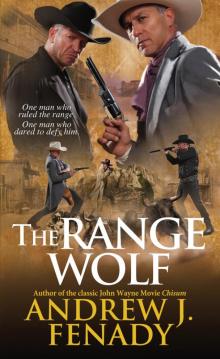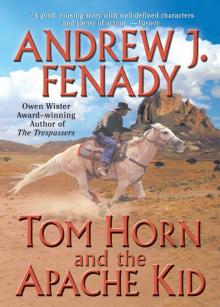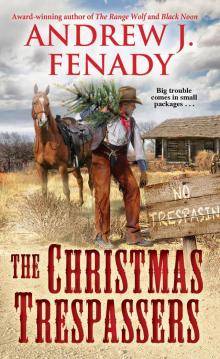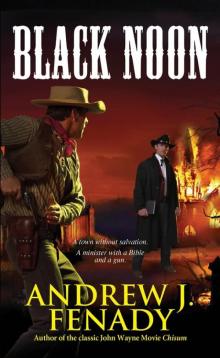- Home
- Andrew J. Fenady
The Range Wolf Page 6
The Range Wolf Read online
Page 6
In the morning this included standing as far away as possible from Cookie while the two of us passed out plates loaded with breakfast and cups filled with coffee to the drovers lined up in front of the two of us near the kitchen wagon.
While so doing I glanced some distance away and discovered that Mr. Wolf Riker talked to horses—at least to one horse. The one he called Bucephalus. And not just a word or two.
Riker stroked the animal’s huge head with one hand, patted its flank with the other, and leaned in close, whispering only the two of them knew what.
I watched, half expecting the horse to talk back, when I heard Pepper’s voice.
“Are we standing in line for morning meal, or what?”
“Oh, yes, excuse me, Mr. Pepper. I was just noticing that Mr. Riker is having quite a conversation with that animal. Bucephalus. Isn’t that his name?”
“They got a lot to talk about, and that is his name. Him and that horse go back a long way—but not as long as him and me. Quite an animal.”
“Which one of them do you mean?”
“I mean you’d best watch your smart remarks.”
“You’re right, of course, and I apologize.”
“More’n seventeen hands high. Powerful as a locomotive. And never bestrided by anyone else. The horse, I mean.”
“I can believe that. Would you like me to fix a plate and coffee for you to take over to him? Mr. Riker, I mean.”
“I don’t fetch for Mr. Riker and he don’t fetch for me.”
“How far back do you go with Mr. Riker?”
“Maybe I’ll tell you sometime. But that ain’t as pertinent as how far ahead we got to go.”
“‘And of all best things upon earth, I hold that a faithful friend is the best.’”
“Is that your opinion, Mr. Guthrie?”
“A poet’s opinion, Mr. Pepper. But I’d wager it’s yours, too.”
“What’re you two palaverin’ about?” came Cookie’s voice.
“Something you wouldn’t understand,” I replied.
Pepper smiled, took his plate and cup of coffee, and hobbled away.
George Leach, the “prison graduate” as Wolf Riker had termed him, elbowed his way in front of the drover who stood in front of Cookie’s line.
“Come on, Cookie, goddamn it, I’m in a hurry.” Leach growled.
“You can hurry to the back of the line, you bastard. First come first served.”
“But I got to ride all the way back to the rear of the herd and . . .”
“You can ride all the way back to the rear of hell, far as I give a damn. It’s first come first served.”
George Leach was not an overly large man, with a pinched face, black olive pits for eyes, and short cropped hair I’d guess he cropped himself. And it was obvious he had a short cropped disposition.
But so did Cookie.
“You get to the back”—Cookie brandished his knife and pointed it close to Leach’s throat—“or you’ll lose your Adam’s apple!”
“Here, Leach,” the one called Dogbreath, who had just received his breakfast from Cookie, shoved his plate and cup into Leach’s hands. “Take mine. I ain’t in no hurry.”
There was a dark pause.
Then Leach took a step back, holding on to Dogbreath’s offering, and snarled at Cookie.
“You ain’t heard the last o’ this!”
“Then I’ll keep listenin’ . . . with this.”
Cookie thrust the knife blade into the table as Leach strutted away.
“You want me to go to the back of the line?” Dogbreath asked.
“Just shut up, you asshole.”
It seemed the crisis had passed . . . at least for the time being.
However, I noticed that the confrontation had not escaped the notice of Mr. Riker and Mr. Pepper, who stood not far away.
After Cookie and I finished the breakfast chores, and before we boarded the kitchen wagon to head north ahead of the herd in preparation for the noon meal, I managed to pay another visit to Dr. Picard and his patient.
“I see you’ve had a change of wardrobe,” he noted.
“Yes, thanks to Alan Reese. I brought you some breakfast, doctor.” I set the tray on the table. “Is there any change in . . . the patient?”
“Not noticeable, Mr. Guthrie, not noticeable. I wish I could be more encouraging, but your fiancée has lost a lot of blood. She’s weak. It could still go either way. But I’m doing all I can.”
“I know that, doctor . . . and appreciate it.”
“Thank you, Mr. Guthrie. I haven’t received much appreciation . . . lately. Not that I deserved it.”
“You deserve it now. Even Wolf Riker would have to concede that.”
“Wolf Riker has never conceded anything. Not even the loss of the Confederacy.”
“I notice he still wears his Confederate belt buckle.
“Oh, yes. And he still has his sword. His unsurrendered sword.”
“That scar on his forehead. From the war?”
“From before the war. A different war. A war he’s still fighting.”
There came a sound from Flaxen, an effort to say something. Unintelligible to me.
“Doctor, can you understand what she’s saying?”
“No. No more than you can . . . or she can. She’s still unconscious. I think you’d better go now and let her rest.”
“I have to go now . . . or undergo another tirade from grease belly.”
“Grease belly?” Dr. Picard smiled.
“Yes. I’m acquiring the nomenclature of the cattle drive . . . and there’s something you have to do now, doctor.”
“What’s that?”
“Eat.” I pointed to the plate and cup on the table. “That’s my prescription.”
“And not a bad one at that. Doctor Guthrie.”
As I left, I reflected on Flaxen’s good fortune. If Dr. Picard had not been on this drive, Flaxen Brewster already would have been dead and buried in the dry sea of Texas.
But in spite of him . . . she still might.
CHAPTER XV
Less than four hours later Texas was anything but a dry sea—at least this part of Texas.
Without warning the sky turned black before noon and brought forth a saturating torrent.
There came the sound of unseen cannon thundering in the distance—then closer, followed by jagged patterns of lightning crisscrossing just above the barely visible horizon.
What had been a dry, baked cake of soil turned into a massive sponge absorbing a cascade of soaking flurry.
Where minutes before were gnarled cracks in the earth suddenly were rivulets, then surging streams.
It was what Texans call a goose drowner—but, of course, there were no geese. No birds or animals of any kind—except those that were a part of the drive. Thousands upon thousands of moaning, snorting, dripping, blinded beeves.
But I found out that cattle are unpredictable creatures—partly because sometimes, they themselves don’t know how they’re going to react under the same circumstances. On some occasions the clap of thunder, like the crescendo of gunshots, will trigger a stampede. On other occasions, such as this one, when, at the same time, the sky unleashes a shower of pelting rain, the animals are stunned, uncertain, and scatter tentatively in multiple directions.
Hooves and horns were moving every which way.
Almost a hundred riderless horses that made up the remuda, battered by the pouring rain, tried turning their backs against the onslaught.
Oxen that pulled the loaded wagons were barely able to draw the wagon wheels through the sudden mud.
One of the wagons carrying supplies twisted and overturned in a glutted gully, spilling its cargo onto the rain splattered barranca.
Chandler, Reese, Smoke, Simpson, Dogbreath, Latimer, Drago, Leach, Morales One, Morales Two, and the rest, along with Wolf Riker, drenched drovers all on horseback, cursed through the downpour, desperately trying to maintain order, or doing their damnest to at least prevent chaos.
I imagine that Cookie’s cursing was the loudest and most blasphemous, but then, he was the nearest to me, and I assume the nearest he’d come to a bath in some time.
And then as abruptly as it began, it was over.
A sudden summer storm quelled by an unseen hand—and the sky a blanket of blue gloss.
The immediate task was to round up the scattered cattle and the horses of the remuda—a task that would consume the rest of the day—and by Wolf Riker’s order, cancel the noon meal.
For the rest of the day Wolf Riker seemed to be everywhere. At the point, on the flanks, at the tail, barking orders, and pointing in all directions at the broken herd, making sure that the gaps were closed and that Leach and the drag men pressured the stragglers into place.
With empty bellies and soaked skin, the drovers never even thought of dismounting until the task was finished.
Another task was to assess the damage. Surprisingly no one was seriously injured, not even the driver of the overturned wagon. The teamsters, including Cookie and me, assisted in turning the wagon upright and replacing a broken wheel.
Precious supplies had been scattered, soaked, and spoiled, lodged in mud.
Through all this, my main concern was for Flaxen, and as soon as I was able, I went to Dr. Picard.
He seemed unperturbed, and if anything, grateful for the respite.
“She’s sleeping like a baby,” he said, “though most babies I’ve come across don’t sleep as reposefully.”
She was indeed asleep and breathing more evenly than before.
“Anybody badly injured out there?”
“Hard to believe, but the answer is no.”
“Macho bastards wouldn’t admit it unless a bone was splintered and hanging out—just to prove how durable they are.”
“Well, no bones were visible as far as I could tell.”
“And how about you, Mr. Guthrie? Any worse for the wear?”
“No, not really . . . and I’m not what you’d call ‘macho.’”
“Maybe not, but I’d say you’re doing all right . . . for a tenderfoot.”
“So are you, doctor. In more ways than one.”
“At another time,” he smiled, “I would have said, ‘I’ll drink to that.’”
As I stepped out of the wagon I heard a voice.
“How’s she doing?”
I turned toward Pepper.
“Seems to be doing all right, and so is Dr. Picard.”
“Still sober?”
“Stone cold.”
“You never can tell.”
“About what?”
“About anything. Take you for example.”
“What about me?”
“Some of the boys were bettin’ that Cookie’ud have you quiverin’ by now.”
“How did you bet, Mr. Pepper?”
“Me? I’m not a bettin’ man, but . . .”
“But, what?”
“If you ever want to borrow my Bowie . . . let me know.”
“I will. And thanks, Mr. Pepper . . . for asking about Flaxen, I mean.”
That night around the campfire, the drovers made up for the missed noon meal by devouring double portions of supper.
Not all the drovers. Some had eaten earlier and were riding slowly on horseback, curling around the regrouped cattle now asleep, and still damp from the day’s cloudburst.
I had heard that cowboys, at the end of a hard day’s work, would relax and smoke and yes, sing the songs of the range and lost loves. What I had heard was confirmed that night. Several of the serenaders, led by Smoke’s deep baritone, were vocalizing one of the favorites.
Oh, Shenandoah, I hear you calling,
Away, you rolling river . . .
Oh Shenandoah, I’m going to leave you
Away I’m bound
Across the wide Missouri
“That’s enough.”
Wolf Riker stepped forward into the light of the campfire, followed by Pepper.
“I’ve got something to say.”
The singing stopped and all faces turned toward Riker.
I, as well as most of the drovers, I think, believed at the time that Wolf Riker was going to take the opportunity to voice a few words of commendation for a day’s work well done during the unexpected storm and what followed in its wake.
Riker inhaled a lungful from his cigar and let the smoke drift away from both nostrils.
“This drive has little more than just begun—and we’re behind schedule. Whose schedule, some of you might ask. I’ll tell you. Mine. And that’s the schedule we’re going to stick to come hell or high tide.
“What happened today is nothing to what’s ahead for a thousand miles, from here to the Red and to Kansas.
“I made my speech before you signed, and all of you did sign . . .”
Wolf Riker looked toward me.
“. . . except for Guth over there . . .and by the great Lord Harry, you’re going to live up to that agreement, if you have to die trying.
“We lost some supplies today, so after tonight we’re going to be on shorter rations, and I don’t want to hear any grumbling from any of you brush poppers. Most of us here lost a war—or so they say. This is a different kind of war, and I promise you one thing—we’re not going to lose this one.
“We’re going to make up for the time we lost today—and then some. This outfit’s going to move and keep moving.
“Now you can go on singing, or turn in and get all the rest you can, because you’re going to need it.”
Wolf Riker stuck the stub of the cigar back into his mouth, turned, and walked away.
Pepper stood for a moment more, scratched at his beard, then limped after the Range Wolf.
So much for Wolf Riker’s words of commendation for the day’s work well done during the storm and what followed.
There was some grumbling among the brush poppers, none of it very audible except from Leach. He concluded by turning to Alan Reese who was nearest to him.
“. . . who the hell does he think he is?”
“Why didn’t you ask him?” Reese responded.
“I’ll do more than ask . . . when the time comes.”
“Sure you will,” Cookie cackled. “About the time you get your third set of teeth.”
“I’m turning in,” Dogbreath said. “I’ve had enough of this bullshit.”
“Me, too,” said Morales One.
“Me, too,” echoed Morales Two.
So ended another day and night on the prairie.
CHAPTER XVI
But in a way it wasn’t the end of the night, not for me. Exhausted as I was from the events and exertions of the day, as I lay on the blanket atop the still damp earth, the component my body craved and silently cried out for—sleep—eluded me, trumped by conflicting speculation and contemplation of the future—if there was a future.
My mind, a scrambled bedlam, would not let go of the faces and events of the foregoing weeks, days, and hours.
Christopher Guthrie, bon vivant, elitist even among the cognoscenti of New York society, wallower in the lavish comfort of a Park Avenue residence, diner at the most expensive restaurants on the continent, escort about town of assorted spoiled, but desirable debutants, attendee and critic of the city’s finest theatrical productions—including my rave review of Edwin Booth’s triumphant return to the stage as Hamlet at the Winter Garden Theatre, little more than a year after his brother, John Wilkes, had assassinated the President of the United States.
Booth’s voice, his soliloquy as Hamlet still echoing in my mind.
What a rogue and peasant slave am I . . .
What a rogue and peasant slave am I . . .
What a rogue and peasant slave am I . . .
And I had become little more than a peasant slave.
From an existence of ease, comfort, and leisure, to the fierce, pitiless society of quasi-civilized vulgarians—Cookie, Leach, Dogbreath, French Frank, and Latimer—to name the worst, most of them dregs of the
Confederacy, now without country or conscience, commanded by the most forceful, contradictory character it had ever been my misfortune to come across.
Instead of being shanghaied on some hell-ship, it was my plight to be conscripted on a desperate, dirt voyage, with a cargo of thousands of recalcitrant cattle, facing God knew what odds; Indians, border raiders, and very likely, a mutinous crew, to say nothing of the shortage of supplies due to an angry sky.
Sacks of beans, flour, and coffee left behind in the mire of a vast expanse called Texas.
Texas—in my mind I tried to visualize a map of Texas, of where we might be now, and of where we were going—names and places I had heard the drovers mention—The Brazos, Illano Estacado, Panhandle, Staked Plains, Dry Tortuga; but they might as well have been talking Chinese, and we might as well have been in China.
Somewhere along the way there had to be at least an outpost of civilization. If not a city or village—a fort, or even a ranch.
Wolf Riker, himself, had acknowledged that I, unlike the others, had not signed on for the drive.
At any of those places he could not prevent me from abandoning the drive—and taking Flaxen with me if she survived.
And I would be more than happy to compensate Riker for his trouble. I had no money with me, thanks to that thief, Cookie. But I still had my bankbook to prove my financial worth—and would make it worth his while.
If there were such a place, an outpost, Wolf Riker would stop and purchase supplies.
And I would purchase my freedom—mine and Flaxen’s. Somehow, the thought of all this set my mind somewhat at ease.
In the meanwhile, I would begin a new journal, of the characters and events chronicling at least one small chapter in the history of the West.
If I survived it might be published and read by some of those countless thousands of pilgrims from all corners of the European continent who now reside in the Eastern region of this continent. The daring, restless souls who dream of adventure and fortune in the Western states and territories—the seekers who hark to what has been called the Manifest Destiny of this great nation.
The first entry into that journal is made up of the hundred or so lines written above—and the journal is entitled

 The Range Wolf
The Range Wolf Tom Horn And The Apache Kid
Tom Horn And The Apache Kid The Christmas Trespassers
The Christmas Trespassers Black Noon
Black Noon